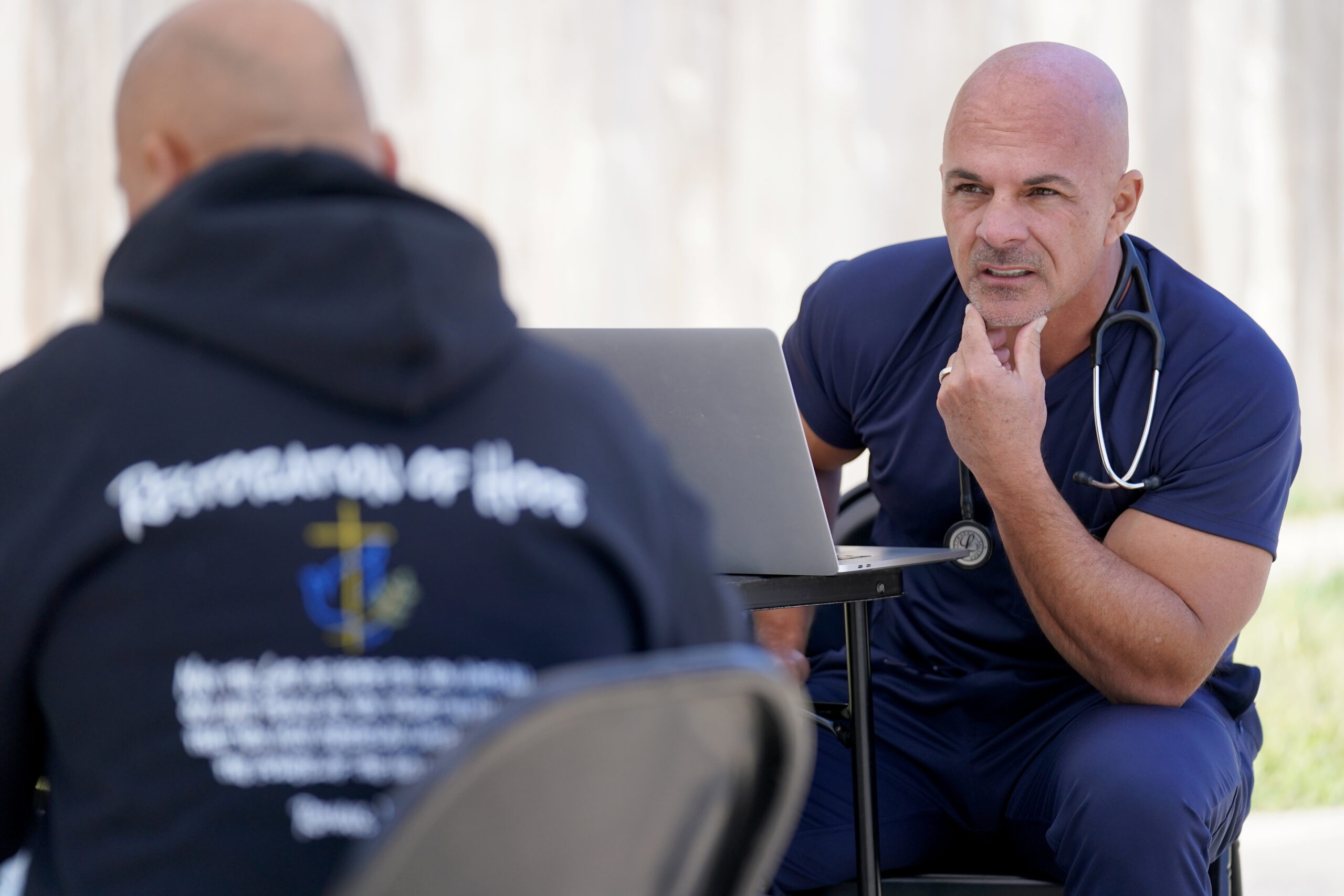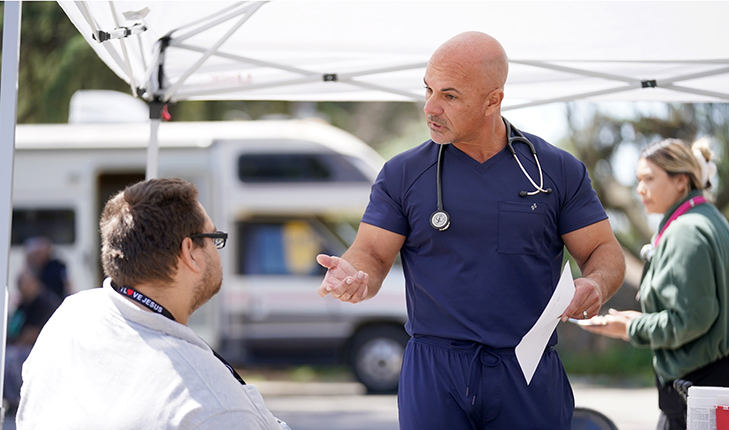Skip to content
Street medicine clinic brings health care to local residents
Every Wednesday, regardless of soaring or frigid temperatures, Dr. Bryan Tune and his street medicine team can be found on the streets of Madera and Fresno, providing no-cost primary health care services to residents in the area, including those who are unhoused or lack basic medical care.
The street medicine team includes Tune as the primary clinician, along with two medical assistants, a housing case manager, a community health worker, a harm reduction specialist and one or two nurse practitioner students in the Master of Science in Nursing program at Fresno State.
The team typically begins its day at 8 a.m. in Madera on the corner of Fourth Avenue and C Street. Across the street is Saint Joachim’s Church and just down the way is the Holy Family Table soup kitchen. The location makes it an ideal spot for the team to set up its popup tent, complete with a table and a few chairs.
“Usually, people go to the soup kitchen to get their meal in the morning and then they come see us for any health care needs they have,” said Tune, a certified family nurse practitioner and associate professor in the School of Nursing at Fresno State. “Typically, these are people that are unhoused and sleeping in the mission, and because of the large population at need, the sleeping quarters are very tight and communicable diseases and infections, like COVID, flu and skin infections tend to spread like wildfire. So we end up being their primary health care providers and resource team for that.”
Before they can even finish setting up, people are already waiting in line – many of them repeat patients who come week after week.
After about an hour, a mother walks by with her two children. She tells Tune she can’t afford the copay to have her children seen at a clinic. Both children have runny noses and a lingering cough.
Tune takes a look at them and asks a few questions before opening his backpack filled with various medical supplies – from stethoscopes to otoscopes to medical kits that screen for the flu, COVID and other ailments. He assesses each child thoroughly and even takes out a throat swab for rapid testing, quickly identifying that the children are only suffering from a viral respiratory infection. He gives them some medication and makes a plan to see the children again next week – same place, same time.
Tune said providing services in Madera helps create a temporary solution to the health care needs in that area, particularly with the closure of Madera Hospital in January 2023.
After spending the morning in Madera, the team heads south down Highway 99 toward Fresno, where it stops at Roeding Park. At this location, which borders Belmont Avenue and Parkway Drive, the typical clientele includes many in the unhoused and sex worker communities.
Here, the street team physically walks the streets, near the homeless shelters and encampments that line the area, providing not just health services, but outreach and resources to those living and/or working on the streets.

“We deal with a very, very sensitive patient population,” Tune said. “Our team offers primary care services on the spot, but also provides individuals with referrals to get into housing or to specialty clinics and LGBT centers, as well as mental health services. We can also refer them to social services, addiction treatment centers and even get them enrolled in Medi-cal right then and there.”
As in Madera, it is typical for Tune and his team to see the same patients each week. Sometimes, the patient requires a follow-up and others just simply want to say hi to a familiar face and someone they trust.
“Many of them know who we are, and they’ll wave and say ‘hey, my sinus infection is all better. Thanks so much for helping me,’” said Tune, adding that many patients also have new ailments that need to be treated.
Tune and his team see up to 20 to 30 patients each Wednesday.
When Tune first started this experience in November 2023, he was partnered with the Whole Person Care Clinic, but now works exclusively with Clinica Sierra Vista, which has allowed for more immediate resources to his patient population and also provides more student clinical training opportunities for nurse practitioner students in the Master of Science in Nursing (MSN) program at Fresno State.
The nurse practitioner students have the opportunity to rotate with Tune during their clinical training, giving each student a chance to experience street medicine and primary care, while working hand-in-hand with one of their primary faculty members. Fourth-semester master’s student Digiovanni Gutierrez is among those participating.
“I was drawn to the opportunity to directly impact the lives of those who are often overlooked in our health care system,” said Gutierrez, who also works as a registered nurse in the post anesthesia care unit at Community Regional Medical Center in downtown Fresno. “This experience has instilled in me a profound belief that health is a fundamental human right and it is something that has enriched my perspective. The opportunity to help the underserved and advocate for their health rights is not just a professional duty, but a personal commitment to fostering a healthier, more equitable community and health care system.”
Tune said this experience is more than just a teaching moment, but also a chance to mentor the next generation of advanced practice providers.
This venture into street medicine is nothing new for Tune, who has spent a majority of his 20-plus year nursing career helping disadvantaged communities and people through missionary work in South America, Central America, Africa and Haiti.
Tune earned his bachelor’s degree in nursing from Fresno State, which propelled him to expand his nursing education, later earning both master’s and doctoral degrees in the field. Now a faculty member, he is committed to service and lifelong learning.
“I foresee doing street medicine for a long time,” Tune said. “It’s a really cool service that we’re doing and it fills my tank so to speak, giving back to the community and caring for these very vulnerable populations. It really makes you think on your feet and use every ounce of training and education you’ve had along the way.”
Share This Story, Choose Your Platform!





